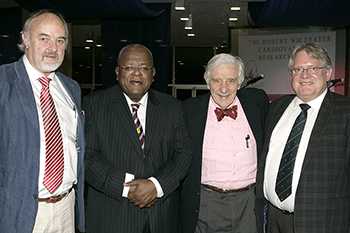Latest News Archive
Please select Category, Year, and then Month to display items
12 January 2024
|
Story Nonsindiswe Qwabe
|
Photo Sonia Small
 Since joining the UFS in 2008, Dr Grey Magaiza has worked extensively on approaches that can foster the socio-economic transformation of societies.
Since joining the UFS in 2008, Dr Grey Magaiza has worked extensively on approaches that can foster the socio-economic transformation of societies.
“The future should be one where communities can decide on their development agenda and futures. That’s the most important for me.” Dr Grey Magaiza, Deputy Director of the Centre for Gender and Africa Studies (CGAS) and Head of the Community Development programme on the Qwaqwa Campus, is passionate about capacitating communities to be agents of change and advancement. His vision for the future emphasises the empowerment of communities to take charge of their development by actively participating in decision making and the implementation of development projects that can improve their lives.
Since joining the UFS in 2008, Dr Magaiza has worked extensively on approaches that can foster the socio-economic transformation of societies. Over the years, he has crafted his research speciality into one that he is most proud of – being an interdisciplinary scientist immersed in the development of communities.
“I’m in a fortunate position of researching what I like. I say ‘fortunate’, because I’ve taken the time to understand what I’m passionate about, which is the overall field of rural livelihoods and livelihood futures – in short, community development. My research starts from an engaged university, understanding the elements that a university must use to enhance transformation and relevance to its immediate community in terms of development.”
One of the ways he has done this is by looking at social entrepreneurship as a development approach for young people in a rural setting. Through workshops with non-profit and civic organisations in Qwaqwa, Dr Magaiza has been helping these organisations to map out their needs and actively meet them through the involvement and support of external role players.
“We understand that communities are part of the national development agenda, but even that national agenda respects community knowledge and intentions and allows communities to shape their identity. A critical enabler of this is community organising. You bring back the capacity in communities to have dialogues on issues affecting them as spaces for engagement, knowledge exchange, and for people to just talk about their way forward.”
By enabling communities to define their development agenda, they can address their specific needs, challenges, and aspirations, he said. “When I look at livelihood futures, it’s quite an exciting aspect of my work – it’s like looking into a fortune tellers’ globe, because you’re not deciding for communities what they should do, but the communities themselves take those decisions.”
UFS Cardiovascular Research Centre a South African solution to continental crisis
2015-11-30

From left are: Dr Robert Kleinloog, president of the Society of Cardiothoracic Surgeons of South Africa, Prof Jonathan Jansen, Vice-Chancellor and Rector of the University of the Free State (UFS), Prof Robert Frater after which the Robert W M Frater Cardiovascular Research Centre was named and Prof Francis Smit, head of Cardiothoracic Surgery at the UFS, at the launch of the new centre.
Photo: Johan Roux |
“You don’t have to be in New York or any big city in the world to establish a cardiovascular centre that delivers work of world standards. I’ve learned that extraordinary things are achieved by ordinary people who apply themselves accordingly. This research centre is a South African solution to a continental challenge”.
These were the words of Prof Robert Frater at the opening of the new Robert W M Frater Cardiovascular Research Centre in the Department of Cardiothoracic Surgery at the University of the Free State (UFS) School of Medicine.
The centre, one of only two of the kind in the country, will focus on bioengineering and cardiovascular research. It was opened on Wednesday 18 November 2015 in the Francois Retief Building on the Bloemfontein campus.
The centre is named after Prof Robert W.M Frater in recognition of his vast contribution to the UFS. He is internationally recognised for his outstanding academic, clinical, and scientific contributions to cardiac surgery. Prof Frater has also been actively involved in research activities of the Department of Cardiothoracic Surgery for the last 10 years. In 2011, he received an honorary doctorate from the UFS.
Under the leadership of Prof Francis Smit, head of Cardiothoracic Surgery, the department has been described as a dynamic unit at the forefront of meeting the different changes in Southern Africa while maintaining an excellent clinical and academic track record.
At the opening, Prof Jonathan Jansen, Vice-Chancellor and Rector of the UFS, thanked Prof Frater for his presence at, involvement in, and support of the UFS. “I am looking forward to working in collaboration with the department to make this university a research centre of excellence in the continent”, he said.
The centre has existing endeavours already in operation, including Population projects, Clinical studies, and Clinical pathology, to name three. In collaboration with the Central University of Technology, the University of Stellenbosch, and Charite University of Berlin, among numerous others, the centre will be an appropriate help to an African challenge.
Its introduction promises advanced research outcomes with the potential to make the Department of Cardiothoracic Surgery a world-class competitor.